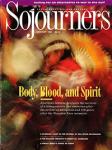Slimy. Dark. Cold. Wet. Slippery. Scary. Fun. Such were the adjectives used to describe a night in a cave beneath West Virginia's highest mountain. For 14 high school juniors, it was an experience never to be forgotten -- an adventure in underground discovery, in establishing friendships, helping one another over the rough spots, and getting some sleep (though very little, they will all tell you, as there were too many drips from the cave's ceiling).
The night in the cave was their "baptismal rite" at the start of a six-week program on Spruce Knob Mountain near Franklin, West Virginia. But the 14 students had already been through a rigorous process to get there, long before they began the steep trek up the mountain and into the cave.
They were among 100 juniors from all across the state, selected from 700 applicants on the basis of their personal achievements and goals for the Woodlands West Virginia Honor Roll. The honor roll, a program of the Woodlands Mountain Institute, is designed to develop new leadership "that will eventually impact both West Virginia and the world by combining the rich cultural values of the Appalachian heritage with academic and scholarly excellence," according to program director Michael S. Curry.
Each of the honor roll students attended one of five three-day symposia held on college campuses throughout the state in the spring. On the basis of their participation there, and through interviews and writing samples, 14 were chosen for the summer Woodlands West Virginia Scholars Program.
I arrived the morning after the night in the cave, in the role of guest instructor, to help the students in the writing of the 100-page autobiographical thesis required of them at the end of their stay on the mountain. I listened as they recounted their night. The experience in the cave had had the desired effect, setting in place avenues of friendship and encouraging in the students their powers of memory, description, and storytelling. Not to mention the fact that it had been just plain fun, providing endless laughs as the stories got told and retold (and refined and embellished).
That afternoon I invited each of the students to think back over their lives and write down their first memory. And then I asked them to put on paper the memory of an event or person that had had the greatest impact on them.
I encouraged them to read their reflections to the group. The sharing was tentative at first. But before long these students, who 24 hours before had known only one another's names, were voicing the deepest hurts and joys that had shaped their young lives.
No two stories were the same. And yet similar themes appeared again and again, seeming at times contradictory, and yet all part of life: pride at personal accomplishments and the insecurity of feeling "different"; the rich bonds and devastating traumas of life as part of a family; joy in a cultural heritage, and the uneasy feeling of being stigmatized by one's roots. Both tears and laughter flowed as the students recognized themselves in one another's stories, despite gender, race, and rural/urban differences.
We focused on two words that evening: unique and universal. We celebrated the fact that each person is an original, that no two of our stories will ever be the same. And that gives each of us a perspective on life and a gift to the world that only we can offer.
And we are able to present that gift with confidence, knowing that, despite our originality, we are all really the same. We have all been hurt, and we have all been overcome at moments with joy. We have felt affirmed, and we have felt left out. We have found pride and fear an uneasy mix in our souls more than once. And so, we can trust that what we have to offer will be understood.
I HAD THE HONOR OF SPENDING three days on the mountain with these young women and men. And I am a richer person for it. I was taught by their enthusiasm and creativity and courage.
Six weeks later Jason Holley, one of the 14, wrote me a letter, describing their graduation ceremony the day before. Each student had read a part of their thesis. "Tears, laughter, happiness, sadness -- all of those echoed from atop the mountain," he wrote. "I really wish you could have been there. It was fabulous." I wish so, too.
Jason included a poem with his letter, dedicated to all of those who had shared the mountain experience with him, offering his gratitude and prayers. His poem began this way:
It was on the mountain
That I met the winged rainbows,
Which flitted from bright yellow
dandelions to deep indigo violets
Across rippling green meadows.
It was on the mountain
That I met each morning sunrise
and each evening sunset,
Like neon watercolors spilled on the sky
So clean and so blue ...
It was on the mountain
That I met old memories;
Some as clear as the water in the lakes nearby,
Some as blurred as the fog in the mornings,
But all as enveloping as both.
The bulk of Jason's poem was a tribute to each of the individuals who had been part of the mountain experience and the community that had formed. He ended it with this verse:
It was on the mountain
That I met love in its rawest form
Expressed in the finest way.
It was on the mountain that I met the spirit of West Virginia,
And I learned the value of my heritage,
And became empowered by it.
It was on the mountain
That I met the people of West Virginia,
And came to love them,
And to delight as one of them.
It was on the mountain
That I met myself.
Joyce Hollyday was associate editor of Sojourners when this article appeared.

Got something to say about what you're reading? We value your feedback!